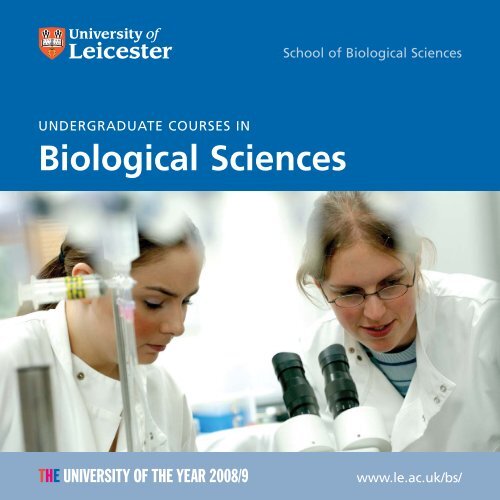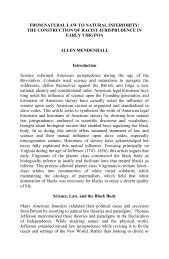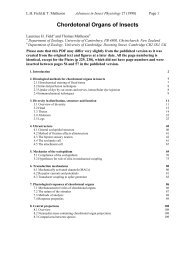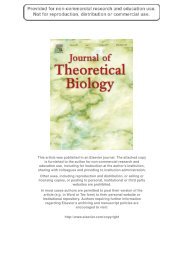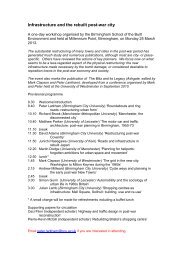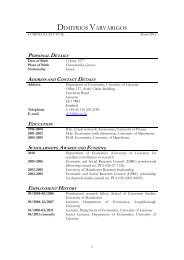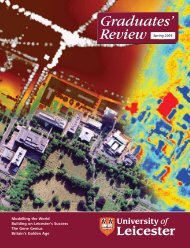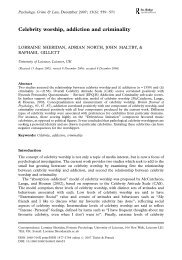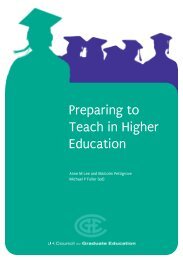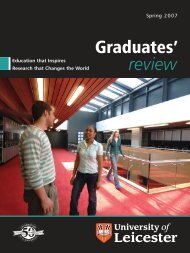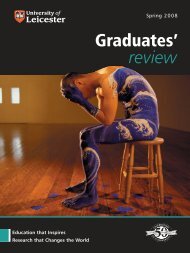Undergraduate Courses in Biological Sciences - University of ...
Undergraduate Courses in Biological Sciences - University of ...
Undergraduate Courses in Biological Sciences - University of ...
You also want an ePaper? Increase the reach of your titles
YUMPU automatically turns print PDFs into web optimized ePapers that Google loves.
School <strong>of</strong> <strong>Biological</strong> <strong>Sciences</strong><br />
UNDERGRADUATE COURSES IN<br />
<strong>Biological</strong> <strong>Sciences</strong><br />
www.le.ac.uk/bs/
2 UNIVERSITY OF LEICESTER · SCHOOL OF BIOLOGICAL SCIENCES<br />
Contents<br />
Welcome to the School <strong>of</strong> <strong>Biological</strong><br />
<strong>Sciences</strong> ..............................................2<br />
Why choose <strong>Biological</strong> <strong>Sciences</strong> at<br />
Leicester ............................................3<br />
Degrees Offered ..................................4<br />
Other Programmes ..............................5<br />
All <strong>Biological</strong> <strong>Sciences</strong><br />
Degrees – First Year ............................6<br />
Degree Options ..............................7-13<br />
Your Learn<strong>in</strong>g Experience ..................14<br />
Entrance Requirements and Further<br />
Information ..................................16-17<br />
The <strong>University</strong> and City <strong>of</strong> Leicester ..19<br />
Contact Details:<br />
To f<strong>in</strong>d out more visit:<br />
www.le.ac.uk/opendays<br />
For further <strong>in</strong>formation please contact<br />
The Admissions Tutor<br />
School <strong>of</strong> <strong>Biological</strong> <strong>Sciences</strong><br />
t: 0116 252 3324/2907<br />
e: bsadm<strong>in</strong>@le.ac.uk<br />
w: www.le.ac.uk/bs<br />
Welcome to the School <strong>of</strong> <strong>Biological</strong> <strong>Sciences</strong><br />
<strong>Biological</strong> <strong>Sciences</strong> at the <strong>University</strong> <strong>of</strong> Leicester has an<br />
<strong>in</strong>ternational reputation based on our research strengths; with<br />
85% <strong>of</strong> our research be<strong>in</strong>g recognised as <strong>in</strong>ternationally significant<br />
<strong>in</strong> the 2008 RAE; and teach<strong>in</strong>g excellence, as evaluated by the<br />
Quality Assurance Agency. In recent years, biological research has<br />
advanced rapidly and has had an amaz<strong>in</strong>g impact on our daily lives<br />
with Leicester at the forefront <strong>of</strong> this.<br />
The <strong>University</strong> is renowned for the discovery <strong>of</strong> DNA Genetic pr<strong>of</strong>il<strong>in</strong>g (f<strong>in</strong>gerpr<strong>in</strong>t<strong>in</strong>g) by<br />
Pr<strong>of</strong>essor Sir Alec Jeffreys which has generated a multi-million pound <strong>in</strong>dustry and has<br />
had pr<strong>of</strong>ound effects <strong>in</strong> the spheres <strong>of</strong> health and crim<strong>in</strong>al justice. Leicester has also<br />
recently been <strong>in</strong>volved <strong>in</strong> research rang<strong>in</strong>g from the development <strong>of</strong> vacc<strong>in</strong>es to<br />
population effects <strong>of</strong> pollutants and restor<strong>in</strong>g and conserv<strong>in</strong>g ecosystems.<br />
The School comprises four departments, Biochemistry, Biology, Cell Physiology and<br />
Pharmacology and Genetics which collaborate <strong>in</strong> teach<strong>in</strong>g and research. Our ability to<br />
<strong>of</strong>fer a wide range <strong>of</strong> degrees gives our students both breadth <strong>of</strong> vision and specialised<br />
knowledge across the whole range <strong>of</strong> Biology.
UNDERGRADUATE COURSES IN BIOLOGICAL SCIENCES 3<br />
Mart<strong>in</strong>e Hamilton Knight<br />
Why choose <strong>Biological</strong> <strong>Sciences</strong> at Leicester<br />
• With an average score <strong>of</strong> 4.4 out <strong>of</strong> 5 for overall student satisfaction,<br />
Leicester has the most satisfied students <strong>in</strong> England amongst ma<strong>in</strong>stream<br />
universities (jo<strong>in</strong>tly with Oxford). (National Student Survey 2007).<br />
• The <strong>University</strong> was named ‘<strong>University</strong> <strong>of</strong> the Year 2008/9’ by Times Higher<br />
Education.<br />
• The School was awarded £4.5 million by the Higher Education Fund<strong>in</strong>g Council<br />
as a ‘Centre <strong>of</strong> Excellence for Teach<strong>in</strong>g and Learn<strong>in</strong>g’ (2005 – 2010).<br />
• We <strong>of</strong>fer a range <strong>of</strong> degrees and flexible courses designed to allow you to<br />
follow your own <strong>in</strong>terests.<br />
• The School was ranked 3rd <strong>in</strong> the UK for Biosciences <strong>in</strong> the Guardian 2009<br />
<strong>University</strong> Guide.<br />
• A degree <strong>in</strong> <strong>Biological</strong> <strong>Sciences</strong> <strong>of</strong>fers you a wide range <strong>of</strong> career<br />
opportunities. Many <strong>of</strong> our graduates follow further tra<strong>in</strong><strong>in</strong>g for research or<br />
teach<strong>in</strong>g careers <strong>in</strong> Biology <strong>of</strong>ten on the MSc or PhD programmes <strong>in</strong> Leicester.<br />
• Our excellence <strong>in</strong> teach<strong>in</strong>g is built on a synergy with <strong>in</strong>ternational<br />
excellence <strong>in</strong> research and your learn<strong>in</strong>g and teach<strong>in</strong>g is effectively supported<br />
by personal tutors and the <strong>University</strong>’s student support services.<br />
“<br />
In the last assessment <strong>of</strong><br />
teach<strong>in</strong>g quality by the Quality<br />
Assurance Agency, <strong>Biological</strong><br />
<strong>Sciences</strong> teach<strong>in</strong>g was rated as<br />
excellent. In the most recent<br />
Academic Audit report, the<br />
panel noted: ‘The School <strong>of</strong><br />
<strong>Biological</strong> <strong>Sciences</strong> gives every<br />
impression <strong>of</strong> be<strong>in</strong>g a well-run<br />
and highly successful School<br />
with great potential for further<br />
success <strong>in</strong> the future. Much is<br />
to be commended.’<br />
Teach<strong>in</strong>g Quality<br />
”<br />
Assessment
4 UNIVERSITY OF LEICESTER · SCHOOL OF BIOLOGICAL SCIENCES<br />
Degrees Offered<br />
Three-year degrees<br />
BSc <strong>Biological</strong> <strong>Sciences</strong><br />
BSc <strong>Biological</strong> <strong>Sciences</strong> (Biochemistry)<br />
BSc <strong>Biological</strong> <strong>Sciences</strong> (Genetics)<br />
BSc <strong>Biological</strong> <strong>Sciences</strong> (Microbiology)<br />
BSc <strong>Biological</strong> <strong>Sciences</strong><br />
(Physiology with Pharmacology)<br />
BSc <strong>Biological</strong> <strong>Sciences</strong> (Zoology)<br />
UCAS code C100 BSc/BS<br />
UCAS code C700 BSc/BSBc<br />
UCAS code C400 BSc/ BSG<br />
UCAS code C500 BSc/BSMb<br />
UCAS code B1B2 BSc/BSPP<br />
UCAS code C300 BSc/BSZ<br />
Four-year degrees<br />
M Biol. Sci. <strong>Biological</strong> <strong>Sciences</strong><br />
UCAS code C000 MBiolSci<br />
A four-year degree with extensive research experience <strong>in</strong> the f<strong>in</strong>al year.<br />
Four-year degrees with year three spent <strong>in</strong> <strong>in</strong>dustry, <strong>in</strong> Europe or the USA<br />
study<strong>in</strong>g at another university or work<strong>in</strong>g <strong>in</strong> a European research laboratory.<br />
“<br />
Hav<strong>in</strong>g missed the opportunity to travel before start<strong>in</strong>g <strong>University</strong>, I jumped at the chance to study abroad dur<strong>in</strong>g<br />
my third year. I embarked upon a research project at the Universidade do Algarve, Portugal, where I had the<br />
opportunity to develop new and <strong>in</strong>valuable skills as well as learn a foreign language and make friends with other<br />
Erasmus students from all over the world. I would recommend tak<strong>in</strong>g a year abroad to everyone, not only do you<br />
get the chance to be <strong>in</strong>volved <strong>in</strong> a current research project but you’ll also have the time <strong>of</strong> your life!<br />
Amanda<br />
”<br />
Kent-Smith,<br />
Microbiology Graduate
UNDERGRADUATE COURSES IN BIOLOGICAL SCIENCES 5<br />
BSc <strong>Biological</strong> <strong>Sciences</strong> with a Year <strong>in</strong> Industry<br />
If you are successful <strong>in</strong> the competitive selection process you may transfer to the<br />
four-year programme and spend your third year work<strong>in</strong>g <strong>in</strong> <strong>in</strong>dustry before return<strong>in</strong>g<br />
to Leicester for the f<strong>in</strong>al year. Previous students have spent their sandwich year<br />
work<strong>in</strong>g <strong>in</strong> companies such as Astra Zeneca and Glaxo Smithkl<strong>in</strong>e. Others have<br />
spent their sandwich year <strong>in</strong> research <strong>in</strong>stitutions such as the Animal Health Institute<br />
and Kew Gardens.<br />
BSc <strong>Biological</strong> <strong>Sciences</strong> (European Union)<br />
Through this four-year programme, you may choose to spend your third year tak<strong>in</strong>g<br />
courses at universities <strong>in</strong> France, Denmark, Spa<strong>in</strong>, Germany or F<strong>in</strong>land. Alternatively,<br />
you can spend the year work<strong>in</strong>g <strong>in</strong> a research laboratory at the <strong>University</strong> <strong>of</strong> the<br />
Algarve <strong>in</strong> Portugal.<br />
BSc <strong>Biological</strong> <strong>Sciences</strong> with a Year <strong>in</strong> North America<br />
The School also has l<strong>in</strong>ks with universities <strong>in</strong> the USA, where you can take your third<br />
year <strong>of</strong> study before return<strong>in</strong>g to Leicester for the f<strong>in</strong>al year.<br />
Other Programmes<br />
The School also <strong>of</strong>fers the follow<strong>in</strong>g degree programmes, for which brochures are<br />
available:<br />
BSc Medical Biochemistry<br />
BSc Medical Genetics<br />
BSc Medical Physiology<br />
BSc Medical Microbiology<br />
C720<br />
C431<br />
B120<br />
C521<br />
We also <strong>of</strong>fer a one year Science Foundation Programme which is run <strong>in</strong> conjunction<br />
with the adjacent Wyggeston and Queen Elizabeth College. This course is designed<br />
ma<strong>in</strong>ly for mature or <strong>in</strong>ternational students.
e<strong>in</strong>force all the new material that we covered. ”<br />
T<strong>in</strong>a Godfrey, 2008 Graduate<br />
6 UNIVERSITY OF LEICESTER · SCHOOL OF BIOLOGICAL SCIENCES<br />
All <strong>Biological</strong> <strong>Sciences</strong> Degrees – First Year<br />
Seven variations <strong>of</strong> the degrees <strong>in</strong> <strong>Biological</strong> <strong>Sciences</strong> are<br />
<strong>of</strong>fered, <strong>in</strong>clud<strong>in</strong>g the M.Biol.Sci., but all students take the same<br />
modules that provide a common first year cover<strong>in</strong>g the breadth<br />
<strong>of</strong> modern biology, from molecules to populations.<br />
The first year develops your understand<strong>in</strong>g <strong>of</strong> <strong>in</strong>formation transfer <strong>in</strong> biological<br />
systems, macromolecular structures, enzyme k<strong>in</strong>etics, membrane structure and<br />
function and metabolic pathways. You will be <strong>in</strong>troduced to the cell and<br />
developmental biology <strong>of</strong> plants and animals and their vast diversity, from both<br />
evolutionary and environmental perspectives. You will study the basic concepts <strong>of</strong><br />
genetics and genetic analysis us<strong>in</strong>g both traditional and molecular approaches, so<br />
that you will be able to describe the effects <strong>of</strong> mutations and expla<strong>in</strong> how they arise.<br />
Physiological processes <strong>in</strong> whole tissues and body systems, such as the cardiovascular<br />
and respiratory systems, are <strong>in</strong>vestigated. You will also explore the diversity <strong>of</strong> plants<br />
and animals and the l<strong>in</strong>ks between environmental and evolutionary biology and how<br />
these relate to animal behaviour. There will be an <strong>in</strong>troduction to the structure and<br />
function <strong>of</strong> microorganisms and consideration <strong>of</strong> their impact on the biosphere.<br />
Modules will also be taken <strong>in</strong> IT and Numeracy Skills, Study and Communication Skills<br />
and Chemistry, which provide an essential basis for second and third year modules,<br />
and will help you to develop your key skills.<br />
Throughout the first year, you will ga<strong>in</strong> practical experience <strong>in</strong> the laboratory classes<br />
associated with each module and have the opportunity to discuss topics <strong>in</strong> the<br />
tutorials that form an <strong>in</strong>tegral part <strong>of</strong> the learn<strong>in</strong>g process.<br />
Re the 1st year…<br />
“….the recommended books, approachable lecturers and excellent<br />
laboratory facilities with appropriate practical session really helped to
UNDERGRADUATE COURSES IN BIOLOGICAL SCIENCES 7<br />
<strong>Biological</strong> <strong>Sciences</strong> BSc<br />
UCAS Code C100 BSc/BS<br />
Three years full-time or four years with a year <strong>in</strong> Industry/Europe/USA<br />
After successful completion <strong>of</strong> the first year, by choos<strong>in</strong>g from the full range <strong>of</strong><br />
modules available <strong>in</strong> the subject areas <strong>of</strong>fered, you may beg<strong>in</strong> either to specialise <strong>in</strong><br />
one <strong>of</strong> the degree streams <strong>in</strong> the second year or reta<strong>in</strong> a broad approach to the<br />
subject. Even with<strong>in</strong> a specialist degree stream, you will still have choice <strong>of</strong> modules <strong>in</strong><br />
addition to those core to your specialism.<br />
In the f<strong>in</strong>al year you will take a selection <strong>of</strong> advanced modules. If you wish to graduate<br />
with a named degree, 75% <strong>of</strong> the modules must be from with<strong>in</strong> the selection for that<br />
degree. All f<strong>in</strong>al year students also undertake a laboratory-, field- or library-based research<br />
project <strong>in</strong> which you have the opportunity to carry out an <strong>in</strong>-depth study <strong>of</strong> a specific topic<br />
that <strong>in</strong>terests you, under the supervision <strong>of</strong> an acknowledged expert <strong>in</strong> the field.<br />
M.Biol.Sci. <strong>Biological</strong> <strong>Sciences</strong><br />
UCAS Code C000 MBiolSci<br />
Four years full-time or five years sandwich or with a year <strong>in</strong> Europe.<br />
This programme is built on the BSc programmes to enable you to develop the skills <strong>of</strong> an<br />
<strong>in</strong>dependent researcher. You can follow any <strong>of</strong> the BSc streams for the first three years and<br />
then, provided you are do<strong>in</strong>g well enough, you go on to take the fourth year which<br />
<strong>in</strong>volves an advanced course <strong>in</strong> research skills and an extended laboratory research project.<br />
“<br />
Currently, I am a senior scientist with<strong>in</strong> the Therapeutics group at a biotechnology company which identifies novel<br />
therapeutic opportunities from its research solely on human tissue. To be successful <strong>in</strong> this role, it is imperative to<br />
have a broad understand<strong>in</strong>g <strong>of</strong> a number <strong>of</strong> scientific areas <strong>in</strong>clud<strong>in</strong>g physiology, genetics, biochemistry and<br />
pharmacology, rather than a specialised but limited scientific background. My basic knowledge <strong>in</strong> all these areas<br />
was established dur<strong>in</strong>g my degree course, and has provided the foundations for my current career. ”<br />
Dr Rick Davis,<br />
<strong>Biological</strong> <strong>Sciences</strong> Graduate
8 UNIVERSITY OF LEICESTER · SCHOOL OF BIOLOGICAL SCIENCES<br />
Hanna Tilly<br />
<strong>Biological</strong> <strong>Sciences</strong> 2008 Graduate<br />
“I want to do Medic<strong>in</strong>e so <strong>Biological</strong><br />
<strong>Sciences</strong> is a stepp<strong>in</strong>g stone to this. I’m<br />
also <strong>in</strong>terested <strong>in</strong> human physiology<br />
which is why I have chosen the<br />
Physiology with Pharmacology degree<br />
stream. The course has a wide range <strong>of</strong><br />
module selections. Staff <strong>in</strong> the School<br />
are really helpful. There is a careers<br />
advisory service that caters specifically<br />
for biological sciences students. They<br />
run a lot <strong>of</strong> talks and help you organise<br />
work experience and placements dur<strong>in</strong>g<br />
the summer.”<br />
“The city <strong>of</strong> Leicester is the friendliest<br />
place I’ve ever been. It’s not too big and<br />
<strong>in</strong>timidat<strong>in</strong>g and it’s good because it’s a<br />
multicultural city; <strong>in</strong>ternational students<br />
will feel welcome here.”<br />
“I live at home while I study and if other<br />
students were to do the same, my advice<br />
would be to still get <strong>in</strong>volved. I’m a<br />
member <strong>of</strong> the badm<strong>in</strong>ton society and<br />
I’m also an Education Representative for<br />
<strong>Biological</strong> <strong>Sciences</strong> so I attend Student<br />
Union Council. It’s a good way to get to<br />
know other students.”<br />
I’d def<strong>in</strong>itely recommend Leicester; it’s a<br />
great university and very prestigious.<br />
Students love it; you can see this from<br />
the National Student Survey. It also has<br />
one <strong>of</strong> the best Students’ Unions <strong>in</strong> the<br />
country. If you want an all-round<br />
university, Leicester is a good choice.”
UNDERGRADUATE COURSES IN BIOLOGICAL SCIENCES 9<br />
<strong>Biological</strong> <strong>Sciences</strong> (Biochemistry) BSc<br />
UCAS Code C700 BSc/BSBc<br />
Three years full-time or four years with a year <strong>in</strong> Industry/Europe/USA<br />
First year The Biochemistry course covers the structure and importance <strong>of</strong> DNA<br />
and prote<strong>in</strong>s <strong>in</strong> a cellular context. Particular emphasis is placed on the structure<br />
and mechanism <strong>of</strong> enzymes. Aspects <strong>of</strong> bioenergetics and cellular metabolism<br />
are also <strong>in</strong>troduced.<br />
Second year topics <strong>in</strong> Biochemistry develop your appreciation <strong>of</strong> the varied<br />
nature <strong>of</strong> prote<strong>in</strong>s and their functional importance to the behaviour <strong>of</strong> cells<br />
and organisms. You will study the expression <strong>of</strong> genetic <strong>in</strong>formation <strong>in</strong>to the<br />
f<strong>in</strong>al prote<strong>in</strong> product. With the aid <strong>of</strong> computer graphics you will explore the<br />
relationship between prote<strong>in</strong> structure and function. You will also consider<br />
how prote<strong>in</strong>s are organised <strong>in</strong>to complex networks with<strong>in</strong> cells, <strong>in</strong>clud<strong>in</strong>g the<br />
molecular mach<strong>in</strong>ery controll<strong>in</strong>g such processes as cell division and movement.<br />
You will study <strong>in</strong> further detail the ways <strong>in</strong> which food materials are processed<br />
both to liberate energy and to generate the build<strong>in</strong>g blocks needed for our<br />
own bodies.<br />
F<strong>in</strong>al year modules <strong>in</strong>clude the study <strong>of</strong> the molecular basis <strong>of</strong> human cancer.<br />
You are <strong>of</strong>fered the opportunity to learn more about techniques used <strong>in</strong> the<br />
study <strong>of</strong> prote<strong>in</strong> structure and prote<strong>in</strong> complexes and their importance <strong>in</strong> cells.<br />
The methodology <strong>of</strong> research and an up-to-date understand<strong>in</strong>g <strong>of</strong> the<br />
molecular mechanisms <strong>of</strong> gene expression constitute another major component<br />
<strong>of</strong> the f<strong>in</strong>al year options. You will also undertake a laboratory- or library-based<br />
research project on a biochemical topic that <strong>in</strong>terests you, under the supervision<br />
<strong>of</strong> an acknowledged expert <strong>in</strong> the field.<br />
“<br />
Despite the extra pressure I th<strong>in</strong>k I enjoyed the third year the most because I got to totally focus on the th<strong>in</strong>gs that<br />
<strong>in</strong>terested me the most, <strong>in</strong> my case biochemistry, and, s<strong>in</strong>ce I chose to do a lab-based project, I got some experience<br />
<strong>of</strong> laboratory work which both prepared and encouraged me to study for a PhD because I enjoyed it so much. ”<br />
Claudia Fogl, 2006 Graduate
10 UNIVERSITY OF LEICESTER · SCHOOL OF BIOLOGICAL SCIENCES<br />
<strong>Biological</strong> <strong>Sciences</strong> (Genetics) BSc<br />
UCAS Code C400 BSc/BSG<br />
Three years full-time or four years with a year <strong>in</strong> Industry/Europe/USA<br />
Genetics is important <strong>in</strong> many aspects <strong>of</strong> society <strong>in</strong>clud<strong>in</strong>g human health, food<br />
production, quality <strong>of</strong> the environment, conservation, ethics and the law. The aim <strong>of</strong> the<br />
Genetics course is to provide a balanced coverage <strong>of</strong> modern genetics focus<strong>in</strong>g on the<br />
organisation, <strong>in</strong>heritance, expression and evolution <strong>of</strong> genes <strong>in</strong> organisms rang<strong>in</strong>g from<br />
bacteria to man.<br />
In the first year you will learn how genes function and are <strong>in</strong>herited. In the second<br />
year you will learn how genomes are organised and <strong>in</strong>vestigated. You will ga<strong>in</strong><br />
experience <strong>of</strong> the range <strong>of</strong> techniques and approaches that can be used to <strong>in</strong>vestigate<br />
the role <strong>of</strong> genes <strong>in</strong> complex biological situations, such as the development <strong>of</strong><br />
organisms and the response <strong>of</strong> organisms to their environment. You will be <strong>in</strong>troduced<br />
to the expand<strong>in</strong>g role <strong>of</strong> genetics <strong>in</strong> the diagnosis and treatment <strong>of</strong> disease.<br />
In the f<strong>in</strong>al year you will have the opportunity to study specialised topics <strong>in</strong> genetics to<br />
an advanced level. These <strong>in</strong>clude human genetics, microbial genetics, evolution, the<br />
effect <strong>of</strong> the environment on our genomes and the study <strong>of</strong> gene function <strong>in</strong><br />
development. You will also undertake a laboratory- or library-based research project <strong>in</strong><br />
which you have the opportunity to carry out an <strong>in</strong>-depth study <strong>of</strong> a topic <strong>in</strong> genetics that<br />
<strong>in</strong>terests you, under the supervision <strong>of</strong> an acknowledged expert <strong>in</strong> the field.<br />
“<br />
I thoroughly enjoyed my time study<strong>in</strong>g at Leicester and would recommend<br />
the course to anyone wish<strong>in</strong>g to study biology. The broad basis <strong>of</strong><br />
teach<strong>in</strong>g <strong>in</strong> the first year allows you to make an educated choice on what<br />
you want to specialise <strong>in</strong>. I had barely covered Genetics before I came to<br />
Leicester, but the first year showed me what I was miss<strong>in</strong>g and I was able<br />
to choose modules to specialise <strong>in</strong> the areas I enjoyed most. Also hav<strong>in</strong>g<br />
the wider knowledge <strong>of</strong> biology from the first year has proved <strong>in</strong>valuable<br />
<strong>in</strong> try<strong>in</strong>g to get to grips with the more complex aspects <strong>of</strong> Genetics.<br />
Jo Purves, 2006 Graduate<br />
”
UNDERGRADUATE COURSES IN BIOLOGICAL SCIENCES 11<br />
<strong>Biological</strong> <strong>Sciences</strong> (Microbiology) BSc<br />
“<br />
The broad scope <strong>of</strong> study <strong>in</strong> the<br />
first year ensured I covered all<br />
aspects the School <strong>of</strong>fered, which<br />
allowed me to discover and focus<br />
on my strengths <strong>in</strong> the 2nd and<br />
3rd years. The work was<br />
challeng<strong>in</strong>g and stimulat<strong>in</strong>g and<br />
the staff helpful and accessible<br />
throughout. I have recommended<br />
the Microbiology course to many<br />
people and will, without a doubt,<br />
cont<strong>in</strong>ue to do so.<br />
Krusha Patel,<br />
”<br />
2008 Graduate<br />
UCAS Code C500 BSc/BSMb<br />
Three years full-time or four years with a year <strong>in</strong> Industry/Europe/USA<br />
The course expla<strong>in</strong>s and emphasizes those features that make micro-organisms,<br />
<strong>in</strong>clud<strong>in</strong>g viruses, special and remarkable biological entities. The common first year<br />
<strong>in</strong>cludes an <strong>in</strong>troduction to microbial form and function and consideration <strong>of</strong> the role<br />
<strong>of</strong> micro-organisms <strong>in</strong> the biosphere.<br />
For part <strong>of</strong> your second year you will hear about the diversity and flexibility with<strong>in</strong> the<br />
microbial world. You will study form, function and habitats <strong>of</strong> bacteria and eukaryotic<br />
micro-organisms; their <strong>in</strong>dustrial uses and the diseases they cause. An exam<strong>in</strong>ation <strong>of</strong><br />
the variety <strong>of</strong> structures and mechanisms <strong>of</strong> replication <strong>of</strong> viruses plus an <strong>in</strong>troduction<br />
to immunology are also part <strong>of</strong> the second year. A field course held dur<strong>in</strong>g the Easter<br />
vacation gives you the opportunity to visit <strong>in</strong>dustrial microbiology laboratories.<br />
Dur<strong>in</strong>g the f<strong>in</strong>al year you will <strong>in</strong>vestigate the complex <strong>in</strong>teractions between<br />
pathogens and their hosts, analyse the mechanisms <strong>of</strong> immunity and the nature <strong>of</strong><br />
microbial pathogenicity, the molecular approach to vacc<strong>in</strong>e development, the role <strong>of</strong><br />
viruses <strong>in</strong> cancer and the biology <strong>of</strong> AIDS and prion diseases (such as BSE –“mad cow<br />
disease”). An environmental microbiology module considers the role <strong>of</strong> bacteria <strong>in</strong><br />
terrestrial and aquatic environments, with an analysis <strong>of</strong> the current views on the<br />
orig<strong>in</strong> <strong>of</strong> life and <strong>in</strong>cludes aspects <strong>of</strong> microbial biogeochemistry, plant/microbe<br />
<strong>in</strong>teractions and the microbiology <strong>of</strong> pollution, waste-management and<br />
bioremediation. Other options, such as our module on Industrial Microbiology,<br />
consider aspects <strong>of</strong> microbial molecular biology <strong>of</strong> relevance to modern<br />
biotechnology. You will also undertake a laboratory- or library-based research project<br />
<strong>in</strong> which you have the opportunity to carry out an <strong>in</strong>-depth study under the<br />
supervision <strong>of</strong> an expert on a specific microbiological topic that <strong>in</strong>terests you.
12 UNIVERSITY OF LEICESTER · SCHOOL OF BIOLOGICAL SCIENCES<br />
<strong>Biological</strong> <strong>Sciences</strong> (Physiology with Pharmacology) BSc<br />
UCAS Code B1B2 BSc/BSPP<br />
Three years full-time or four years with a year <strong>in</strong> Industry/Europe/USA<br />
As part <strong>of</strong> the common first year you will have an <strong>in</strong>troduction to physiological<br />
processes occurr<strong>in</strong>g <strong>in</strong> whole tissues and systems with an emphasis on the<br />
underly<strong>in</strong>g cellular mechanisms.<br />
The second year modules focus on cellular and systems physiology and will<br />
<strong>in</strong>troduce you to the concepts underly<strong>in</strong>g pharmacology and the mechanisms <strong>of</strong><br />
drug action. Cell physiology addresses the properties <strong>of</strong> non-excitable and excitable<br />
cells <strong>in</strong>clud<strong>in</strong>g the mechanisms by which cell homeostasis is ma<strong>in</strong>ta<strong>in</strong>ed. There is a<br />
strong focus on the organisation and physiology <strong>of</strong> the nervous system. The systems<br />
aspect <strong>in</strong>troduces you to the physiology <strong>of</strong> the major body systems whilst<br />
pharmacology concentrates on the mechanism <strong>of</strong> action <strong>of</strong> major classes <strong>of</strong> drugs<br />
act<strong>in</strong>g on these different body systems.<br />
The f<strong>in</strong>al year modules cover topics from the cellular to the organismal level. Much<br />
attention is focused on the communication <strong>in</strong> the nervous system and on the<br />
cellular responses <strong>of</strong> neurones to chemical messengers and drugs. The visual and<br />
auditory systems are used as examples to highlight the pr<strong>in</strong>ciples <strong>of</strong> central<br />
<strong>in</strong>tegration along with the mechanisms underly<strong>in</strong>g memory and movement control.<br />
There is also a strong emphasis on the cardiovascular system which provides<br />
students with a comprehensive understand<strong>in</strong>g <strong>of</strong> heart function and regulation <strong>of</strong><br />
blood flow. Comparative physiology taught jo<strong>in</strong>tly by physiologists and zoologists<br />
exam<strong>in</strong>es the different mechanisms by which dist<strong>in</strong>ct animal groups have solved<br />
basic physiological problems such as locomotion and vision. In your f<strong>in</strong>al year you<br />
will also undertake a laboratory – or library-based <strong>in</strong>-depth research project on a<br />
specific topic related to physiology that <strong>in</strong>terests you.<br />
“<br />
I specialised <strong>in</strong> <strong>Biological</strong> <strong>Sciences</strong> (Physiology with Pharmacology). I<br />
found most <strong>of</strong> the courses really <strong>in</strong>terest<strong>in</strong>g and the lecturers and other<br />
staff are always available and happy to help when you f<strong>in</strong>d anyth<strong>in</strong>g<br />
difficult. Leicester is a lively place to study with loads to do. ”<br />
Rachael Qu<strong>in</strong>n,<br />
Currently Study<strong>in</strong>g Medic<strong>in</strong>e
UNDERGRADUATE COURSES IN BIOLOGICAL SCIENCES 13<br />
<strong>Biological</strong> <strong>Sciences</strong> (Zoology) BSc<br />
UCAS Code C300 BSc/BSZ<br />
Three years full-time or four years with a year <strong>in</strong> Industry/Europe/USA<br />
The BSc <strong>in</strong> <strong>Biological</strong> <strong>Sciences</strong> (Zoology) at Leicester provides you with a<br />
comprehensive understand<strong>in</strong>g <strong>of</strong> the practical and theoretical approaches that<br />
zoologists currently use to tackle some <strong>of</strong> the fundamental unanswered questions <strong>in</strong><br />
neurobiology, animal behaviour, ecology and evolutionary biology.<br />
In the first year you will study a series <strong>of</strong> modules that <strong>in</strong>troduce the key elements<br />
underp<strong>in</strong>n<strong>in</strong>g animal biology, <strong>in</strong>clud<strong>in</strong>g details <strong>of</strong> genetics, cell function,<br />
development, behaviour, physiology and evolution.<br />
In the second year you will ga<strong>in</strong> further <strong>in</strong>sight <strong>in</strong>to the mechanisms underly<strong>in</strong>g<br />
animal behaviour, development and evolution. For example, what strategies do<br />
animals use to organise their behaviour so as to maximise reproductive output<br />
What genetic and cellular mechanisms guide the development <strong>of</strong> a s<strong>in</strong>gle fertilised<br />
egg <strong>in</strong>to a complex adult organism You will also tackle the complex nature <strong>of</strong> hostparasite<br />
<strong>in</strong>teractions, animal ecology and population biology, and address the theme<br />
<strong>of</strong> biodiversity on a fieldcourse to Mallorca.<br />
Our f<strong>in</strong>al year courses provide a range <strong>of</strong> specialised comb<strong>in</strong>ations for you to study<br />
to an advanced level, <strong>in</strong>clud<strong>in</strong>g topics such as Comparative Neurobiology, Social<br />
Evolution, Molecular Ecology and Applied Ecology. We run popular residential<br />
fieldcourses focus<strong>in</strong>g on practical aspects <strong>of</strong> analys<strong>in</strong>g animal behaviour <strong>in</strong> the wild.<br />
You will be taught by specialists who are research<strong>in</strong>g at the frontiers <strong>of</strong> their<br />
science, so you will be exposed to the latest research ideas and f<strong>in</strong>d<strong>in</strong>gs. You will<br />
learn how to weigh up conflict<strong>in</strong>g evidence and synthesise <strong>in</strong>formation from a wide<br />
range <strong>of</strong> sources, and will also have the opportunity to carry out a detailed research<br />
project <strong>of</strong> your own that permits you to address key questions <strong>in</strong> Biology.<br />
Read<strong>in</strong>g for a degree <strong>in</strong> Zoology at the <strong>University</strong> <strong>of</strong> Leicester will present you with a<br />
range <strong>of</strong> excit<strong>in</strong>g and <strong>in</strong>terest<strong>in</strong>g ideas and challenges, and will provide you with the<br />
depth and breadth <strong>of</strong> tra<strong>in</strong><strong>in</strong>g necessary to progress to postgraduate study or to<br />
jobs across a broad range <strong>of</strong> applied biological fields.<br />
“<br />
You cannot help but get caught up <strong>in</strong> the enthusiasm <strong>of</strong> the teach<strong>in</strong>g, many <strong>of</strong> the lecturers are at the forefront<br />
<strong>of</strong> their research field, so <strong>in</strong> effect you’re be<strong>in</strong>g taught by the best. ”<br />
Adam Tozer, 2008 Graduate
14 UNIVERSITY OF LEICESTER · SCHOOL OF BIOLOGICAL SCIENCES<br />
Your Learn<strong>in</strong>g Experience<br />
How will I be assessed<br />
Assessment is based on the follow<strong>in</strong>g:<br />
• Exam<strong>in</strong>ations typically contribute 70% <strong>of</strong> the marks for each<br />
module. In the first year these are usually multiple choice and<br />
short answer papers, with the second and third year<br />
exam<strong>in</strong>ations be<strong>in</strong>g predom<strong>in</strong>antly essay-based.<br />
• Coursework: all modules conta<strong>in</strong> some cont<strong>in</strong>uous assessment,<br />
which typically contributes 30% <strong>of</strong> the marks awarded for each<br />
module. This may <strong>in</strong>clude reports <strong>of</strong> practical work, written<br />
assignments, essays and oral presentations.<br />
• Research Project (F<strong>in</strong>al year). An <strong>in</strong>dividual research study<br />
result<strong>in</strong>g <strong>in</strong> the presentation <strong>of</strong> a dissertation makes up a<br />
significant part <strong>of</strong> the f<strong>in</strong>al year.<br />
How are the courses structured<br />
All <strong>of</strong> our courses are modular<br />
The academic year is divided <strong>in</strong>to two semesters. One <strong>of</strong> the<br />
benefits <strong>of</strong> the modular system is that your overall performance is<br />
fed back to you at the end <strong>of</strong> each semester <strong>in</strong> years one and<br />
two. This enables you to closely monitor your progress and, if<br />
necessary, adjust your work pattern.<br />
Each module has a credit rat<strong>in</strong>g (10 or 20). The credit rat<strong>in</strong>g is an<br />
<strong>in</strong>dication <strong>of</strong> the workload required for the module. Each year you<br />
must complete 120 credits <strong>in</strong> order to progress to the next year.<br />
How will I be taught<br />
Lectures<br />
Lectures form a vital part <strong>of</strong> <strong>University</strong> teach<strong>in</strong>g. They are used to<br />
def<strong>in</strong>e the basic material for a given module. Lecture styles vary<br />
considerably and may <strong>in</strong>clude web-based delivery,<br />
demonstrations/ animations, as well as the traditional lecture<br />
format.<br />
Tutorials<br />
In a tutorial a small group <strong>of</strong> students meets with a member<br />
<strong>of</strong> staff for an hour. The format <strong>of</strong> tutorials will vary between<br />
modules but will <strong>in</strong>volve teamwork. For tutorials students<br />
may be required to research a particular topic associated<br />
with the module concerned and discuss their f<strong>in</strong>d<strong>in</strong>gs with<br />
other members <strong>of</strong> their tutorial group, alternatively tutorials<br />
may take the form <strong>of</strong> problem solv<strong>in</strong>g sessions.<br />
Laboratory classes<br />
<strong>Biological</strong> Science is, <strong>of</strong> course, a very practical subject, and<br />
so strong emphasis is placed on the acquisition <strong>of</strong> varied<br />
laboratory and field-work skills. Dur<strong>in</strong>g your undergraduate<br />
career you will acquire a full range <strong>of</strong> personal transferable<br />
practical, IT, team work and presentation skills. Practical<br />
classes take place <strong>in</strong> well-equipped laboratories, under the<br />
guidance <strong>of</strong> academic staff and postgraduate demonstrators.<br />
Laboratory based research projects allow you the opportunity<br />
to work <strong>in</strong> a research laboratory and ga<strong>in</strong> experience <strong>of</strong><br />
some specialist techniques, for example electron microscopy,<br />
NMR, PCR or patch clamp<strong>in</strong>g.<br />
What facilities will be available<br />
IT provision<br />
IT Services provide a networked microcomputer service to<br />
students, supplemented by Departmental PC sites, <strong>of</strong>fer<strong>in</strong>g<br />
applications s<strong>of</strong>tware, e-mail and access to the Internet and<br />
the <strong>University</strong> Campus Wide Information Service. Student-
UNDERGRADUATE COURSES IN BIOLOGICAL SCIENCES 15<br />
access computer suites are used for some formal teach<strong>in</strong>g<br />
sessions and are available to students for <strong>in</strong>dividual work.<br />
Students have access to their own computer file store, with<br />
common user <strong>in</strong>terface, application s<strong>of</strong>tware etc. from any <strong>of</strong><br />
the 18 Open Access Areas on and <strong>of</strong>f campus.<br />
Library<br />
The <strong>University</strong>’s award-w<strong>in</strong>n<strong>in</strong>g David Wilson Library has an<br />
excellent stock <strong>of</strong> up to date books and receives over 200<br />
periodical titles <strong>in</strong> <strong>Biological</strong> <strong>Sciences</strong>. There is onl<strong>in</strong>e access<br />
to the Library catalogue and to an extensive range <strong>of</strong><br />
journals available across the campus. Additional copies <strong>of</strong><br />
texts <strong>in</strong> demand for taught courses are placed <strong>in</strong> the short<br />
loan collection.<br />
How will I be supported<br />
Personal Tutor<br />
All students are allocated a Personal Tutor who is a member<br />
<strong>of</strong> staff <strong>in</strong> <strong>Biological</strong> <strong>Sciences</strong>. Your tutor receives copies <strong>of</strong><br />
your cont<strong>in</strong>uous assessment feedback forms and you will<br />
normally see your personal tutor two or three times a term<br />
to discuss progress <strong>in</strong> your studies, and <strong>of</strong> course at any<br />
other time if you need advice. Your tutor will provide a<br />
sympathetic ear for all matters <strong>of</strong> personal concern, whether<br />
they be academic, f<strong>in</strong>ancial, hous<strong>in</strong>g, career, social or<br />
personal problems.<br />
Welfare Services<br />
The <strong>University</strong> has a pr<strong>of</strong>essional Welfare Service and the staff<br />
are available to assist with a wide range <strong>of</strong> issues from<br />
manag<strong>in</strong>g your money to deal<strong>in</strong>g with landlords etc. These<br />
will, <strong>of</strong> course, be treated <strong>in</strong> the strictest confidence.<br />
Student Learn<strong>in</strong>g Centre<br />
Support for the development <strong>of</strong> students’ <strong>in</strong>dependent learn<strong>in</strong>g<br />
skills is provided by this centre. Students can make use <strong>of</strong> a year<br />
round programme <strong>of</strong> study workshops, a drop-<strong>in</strong> advisory<br />
centre and a wide range <strong>of</strong> written study guides.<br />
Careers Service<br />
Careers staff provide guidance start<strong>in</strong>g <strong>in</strong> year 1 to all<br />
undergraduates on the importance <strong>of</strong> skills development,<br />
work experience and career plann<strong>in</strong>g. They <strong>of</strong>fer drop-<strong>in</strong><br />
careers advice, a well-stocked <strong>in</strong>formation room, workshops<br />
and practice <strong>in</strong>terviews.
16 UNIVERSITY OF LEICESTER · SCHOOL OF BIOLOGICAL SCIENCES<br />
Entrance Requirements and<br />
Further Information<br />
<strong>Biological</strong> <strong>Sciences</strong> – All Degrees:<br />
A-Levels<br />
Entry requirements are three A-levels, or two A-levels and a<br />
vocational A-level or equivalent, two <strong>of</strong> which should be <strong>in</strong><br />
relevant science subjects, preferably from Biology, Chemistry,<br />
Physics or Mathematics.<br />
However, for certa<strong>in</strong> courses, other science-based subjects may<br />
be acceptable (for example, Geography, Geology or<br />
Environmental Science). A pass <strong>in</strong> GCSE Mathematics and<br />
English is also a requirement.<br />
Other Qualifications<br />
International or European Baccalaureate, and overseas<br />
qualifications are considered. Mature students are welcomed:<br />
alternative qualifications e.g. Access courses considered. Direct<br />
entry <strong>in</strong>to the second year with suitable advanced qualifications<br />
is possible.<br />
Typical Offers:<br />
A-levels: ABB at A2 (AAB for the M.Biol. Sci).<br />
Key Skills: are welcomed <strong>in</strong> addition and may be <strong>in</strong>cluded <strong>in</strong><br />
any <strong>of</strong>fer<br />
Access: Pass with 45 credits at level three, depend<strong>in</strong>g on the<br />
course structure<br />
National Diploma: 5 Dist<strong>in</strong>ctions<br />
Irish leav<strong>in</strong>g Certificate: AABBB, <strong>in</strong>clud<strong>in</strong>g English, at higher<br />
level<br />
Scottish Highers: AABBB<br />
European Baccalaureate: Pass with 70% overall<br />
International Baccalaureate: Pass Diploma with 32-34<br />
po<strong>in</strong>ts<br />
All applicants to whom an <strong>of</strong>fer has been made are <strong>in</strong>vited<br />
to visit the <strong>University</strong> to meet with academic staff and learn<br />
more about our course structure. There are also <strong>University</strong><br />
Open Days when prospective applicants are welcome to<br />
visit and see the campus and departments.
UNDERGRADUATE COURSES IN BIOLOGICAL SCIENCES 17<br />
Your Accommodation<br />
We believe that <strong>University</strong> <strong>of</strong> Leicester accommodation provides<br />
you with a flexible, enjoyable liv<strong>in</strong>g experience. Liv<strong>in</strong>g <strong>in</strong><br />
<strong>University</strong> accommodation is the best way to make the most <strong>of</strong><br />
your time with us. To f<strong>in</strong>d out more about our accommodation<br />
please see www.le.ac.uk/accommodation<br />
Open and Visit Days<br />
We have a number <strong>of</strong> Open Days dur<strong>in</strong>g the year to which you are<br />
very welcome to attend. Additionally, all applicants to our<br />
undergraduate degree course are <strong>in</strong>vited to attend one <strong>of</strong> our<br />
regular Visit Days. Other, <strong>in</strong>dividual visits can be made by<br />
arrangement. You are very welcome to br<strong>in</strong>g a friend or family<br />
member any time you visit the <strong>University</strong>, and we are always happy<br />
to answer any queries on the phone or by email.
18 UNIVERSITY OF LEICESTER · SCHOOL OF BIOLOGICAL SCIENCES<br />
The <strong>University</strong> and the City <strong>of</strong> Leicester<br />
About the City <strong>of</strong> Leicester<br />
Leicester is a lively diverse city with a huge choice <strong>of</strong> pubs,<br />
clubs, restaurants, c<strong>in</strong>emas and theatres, <strong>in</strong>clud<strong>in</strong>g the new<br />
Curve Theatre.<br />
Shopp<strong>in</strong>g wise, Leicester has all the big shops that you could<br />
need. The Highcross Leicester development <strong>in</strong>cludes a 12-screen<br />
c<strong>in</strong>ema, restaurants, cafés and apartments. Leicester also has<br />
many smaller <strong>in</strong>dividual shops <strong>in</strong> ‘The Lanes.’ where you can<br />
pick up unique items.<br />
The New Walk Museum and Art Gallery is one <strong>of</strong> many<br />
museums and art galleries with<strong>in</strong> the city and boasts<br />
permanent displays <strong>in</strong>clud<strong>in</strong>g the Ancient Egyptians and the<br />
D<strong>in</strong>osaurs, and visit<strong>in</strong>g exhibitions such as a recent Picasso<br />
exhibition.<br />
In addition to their usual club nights, most clubs and bars hold<br />
student nights with special prices. The <strong>University</strong> works closely<br />
with the clubs <strong>in</strong> Leicester and there is usually at least one big<br />
student night at the clubs each night.<br />
For live music Leicester is excellent. The Venue at the <strong>University</strong><br />
has recently attracted acts such as Feeder, Pendulum, Scratch<br />
Perverts, The Subways, Arctic Monkeys, We Are Scientists and<br />
Reverend And The Makers. De Montfort Hall is a bigger venue<br />
attract<strong>in</strong>g bigger acts. There is also The Charlotte which is a<br />
smaller venue, for about 300 people, where acts like Snow<br />
Patrol and Thrice have played.<br />
Leicester has four big festivals throughout the year, which are<br />
all great for students. The Summer Sundae Weekender, has<br />
<strong>in</strong>cluded Cold War Kids; Mystery Jets; Macy Gray; Guillemots;<br />
Morcheeba; Amy W<strong>in</strong>ehouse; Mr Scruff; Magic Numbers; The<br />
Div<strong>in</strong>e Comedy; The Pigeon Detectives and Kate Nash. Leicester<br />
also holds an International Music Festival, br<strong>in</strong>g<strong>in</strong>g <strong>in</strong>ternational<br />
jazz and concerts to Leicester. The Caribbean Carnival <strong>of</strong>fers a<br />
mixture <strong>of</strong> Caribbean music, food and costumes and is a great<br />
weekend out. F<strong>in</strong>ally there is the Leicester Comedy Festival.<br />
Held <strong>in</strong> Leicester <strong>in</strong> February it lasts ten days and has <strong>in</strong>cluded<br />
acts such as Russell Brand.<br />
About the <strong>University</strong><br />
The <strong>University</strong> <strong>of</strong> Leicester is a lead<strong>in</strong>g UK university with a<br />
proud past and an excit<strong>in</strong>g future. We deliver high quality<br />
undergraduate, postgraduate and pr<strong>of</strong>essional education and<br />
create research that has impact <strong>in</strong>ternationally.<br />
Leicester was ranked jo<strong>in</strong>t first among ma<strong>in</strong>stream English<br />
universities <strong>in</strong> the 2005, 2006 and 2007 National Student<br />
Surveys for overall student satisfaction.<br />
We are ranked <strong>in</strong> the UK’s top 12 universities by the Good<br />
<strong>University</strong> Guide and 14th <strong>in</strong> the Guardian <strong>University</strong> Guide.<br />
The research conducted by the <strong>University</strong> has the strongest<br />
impact <strong>of</strong> any Midlands university and the tenth greatest<br />
impact <strong>in</strong> the UK accord<strong>in</strong>g to the Guardian. Our students<br />
benefit from be<strong>in</strong>g taught by staff at the cutt<strong>in</strong>g edge <strong>of</strong> their<br />
discipl<strong>in</strong>es and the vibrant and excit<strong>in</strong>g learn<strong>in</strong>g atmosphere<br />
this creates.<br />
The <strong>University</strong> Library is a major research library, provid<strong>in</strong>g<br />
access to over a million pr<strong>in</strong>ted volumes and a wide range <strong>of</strong><br />
electronic journals and <strong>in</strong>formation resources via the web.<br />
The <strong>in</strong>spirational David Wilson Library build<strong>in</strong>g on the ma<strong>in</strong><br />
campus, which opened <strong>in</strong> April 2008, forms a central part <strong>of</strong><br />
the <strong>University</strong>’s ambitious development programme. The<br />
build<strong>in</strong>g, contemporary <strong>in</strong> design, comb<strong>in</strong>es state-<strong>of</strong>-the-art<br />
technology with the strengths <strong>of</strong> a traditional research library<br />
and over 1,500 study places.
UNDERGRADUATE COURSES IN BIOLOGICAL SCIENCES 19<br />
“<br />
The <strong>University</strong> <strong>of</strong> Leicester<br />
provides the friendly and<br />
supportive environment<br />
necessary to develop essential life<br />
skills. They are well organised<br />
and pr<strong>of</strong>icient <strong>in</strong> us<strong>in</strong>g the raw<br />
<strong>in</strong>gredients that are students, to<br />
prepare a recipe for success both<br />
academically and socially. As a<br />
former student I enjoyed my<br />
three years at Leicester, and I<br />
would thoroughly recommend<br />
the <strong>University</strong>! ”<br />
Onebieni Ana,<br />
Currently Study<strong>in</strong>g Medic<strong>in</strong>e<br />
“<br />
Go<strong>in</strong>g to the <strong>University</strong> <strong>of</strong><br />
Leicester has rewarded me with<br />
abundant experiences, great<br />
friends, a sense <strong>of</strong> <strong>in</strong>dependence,<br />
an ambitious ideal and an<br />
honours degree to be proud <strong>of</strong>. I<br />
could re-live the experience a<br />
thousand times over. ”<br />
Bandana Upadhya, 2008 Graduate
For further <strong>in</strong>formation please contact<br />
The Admissions Tutor<br />
School <strong>of</strong> <strong>Biological</strong> <strong>Sciences</strong><br />
<strong>University</strong> <strong>of</strong> Leicester<br />
<strong>University</strong> Road<br />
Leicester LE1 7RH<br />
t: +44 (0)116 252 3324/2907<br />
e: bsadm<strong>in</strong>@le.ac.uk<br />
w: www.le.ac.uk/bs<br />
© <strong>University</strong> <strong>of</strong> Leicester 02/09<br />
Leicester LE1 7RH<br />
UK<br />
www.le.ac.uk<br />
This brochure was<br />
pr<strong>in</strong>ted by AVS Pr<strong>in</strong>t,<br />
<strong>University</strong> <strong>of</strong> Leicester<br />
us<strong>in</strong>g vegetable based <strong>in</strong>ks<br />
on FSC certified stock<br />
1091_0209


